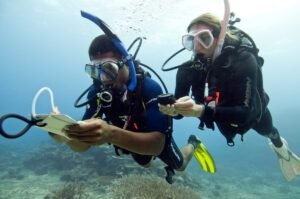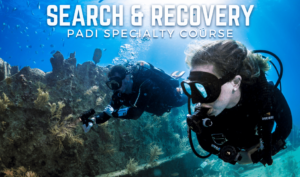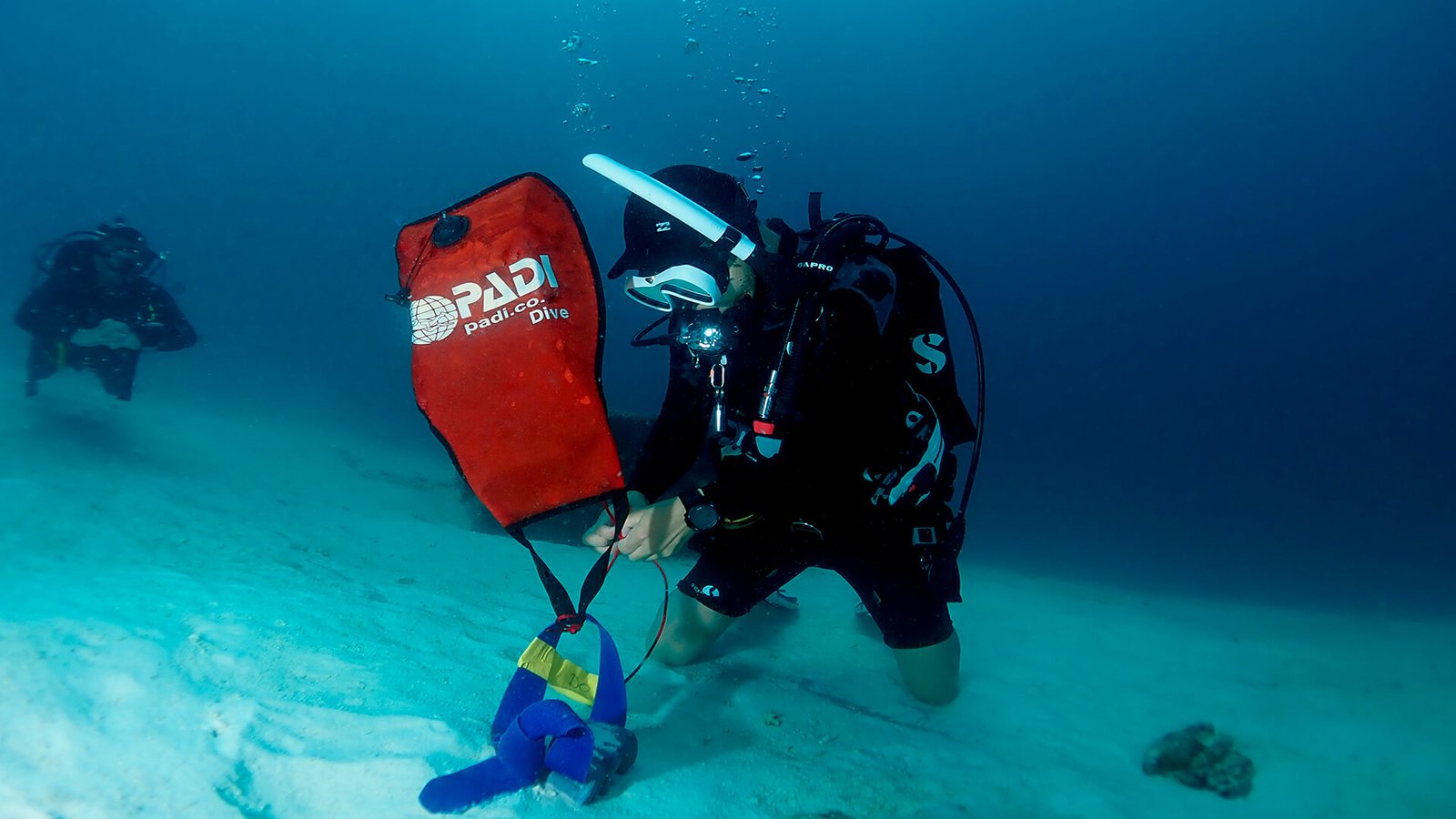Introduction to the PADI Search and Recovery Specialty Course
The PADI Search and Recovery Specialty Course is designed to provide divers with the necessary skills and knowledge to effectively search for and recover lost objects underwater. This course is ideal for divers who want to enhance their diving abilities and contribute to underwater conservation efforts by helping to remove debris and lost items from the ocean.
During the course, divers will learn various search patterns and techniques that are used to systematically cover a designated area. These techniques are essential for locating lost objects such as jewelry, cameras, and even larger items like boat anchors. Divers will also be taught how to properly handle and recover these objects without causing any damage to the surrounding marine environment.
One of the key aspects of the Search and Recovery Specialty Course is learning how to effectively use underwater navigation tools such as compasses and reels. These tools are crucial for maintaining a sense of direction and ensuring that divers do not get disoriented while searching for objects. Divers will also learn how to use lift bags and other buoyancy devices to safely bring objects to the surface.
Furthermore, the course will cover important safety considerations and procedures that divers must follow when conducting search and recovery operations. This includes proper planning and communication with dive buddies, as well as understanding the potential risks associated with searching in low visibility or strong currents. Divers will also learn how to assess and manage their air supply during extended search dives.
By completing the PADI Search and Recovery Specialty Course, divers will not only gain valuable skills and knowledge, but they will also become more responsible and environmentally conscious divers. Removing debris and lost items from the ocean not only helps to protect the marine ecosystem, but it also ensures a safer and more enjoyable diving experience for everyone.
Overall, the PADI Search and Recovery Specialty Course is a comprehensive program that equips divers with the tools and techniques needed to effectively search for and recover lost objects underwater. Whether you are a recreational diver looking to expand your diving skills or a professional diver interested in contributing to underwater conservation efforts, this course offers a valuable opportunity to enhance your diving abilities and make a positive impact on the marine environment.
During these four open water dives, divers will have the opportunity to practice and refine the skills necessary to effectively search for and recover lost objects underwater. Each dive will focus on different aspects of search and recovery techniques, allowing divers to build upon their knowledge and experience with each subsequent dive.
The first dive will introduce divers to the basic principles of underwater search patterns and techniques. They will learn how to effectively navigate underwater using a compass and how to conduct a systematic search of the area. This dive will also cover the proper use of search tools such as reels and lines, which are essential for conducting a successful search and recovery operation.
The second dive will focus on honing divers’ skills in locating and marking underwater objects. Divers will learn how to use different methods such as visual cues, natural landmarks, and reference points to accurately locate and mark the position of the object. They will also practice using buoyancy control to hover in place while performing these tasks, ensuring that they do not disturb the surrounding environment.
The third dive will introduce divers to the techniques used for recovering objects from underwater. They will learn how to properly secure and lift objects of different sizes and weights, using techniques such as lift bags and lift slings. Divers will also learn how to safely transport the recovered objects to the surface, ensuring that they are not damaged during the ascent.
The fourth and final dive will be a culmination of all the skills and techniques learned throughout the course. Divers will be tasked with conducting a full search and recovery operation, from planning and executing the search pattern to successfully locating and recovering the object. This dive will test divers’ ability to apply their knowledge and skills in a real-world scenario, and will serve as a final assessment of their competency in search and recovery techniques.
By completing these four open water dives, divers will not only meet the minimum requirements for the PADI Search and Recovery Specialty Course, but they will also gain valuable experience and confidence in their ability to conduct underwater searches and recoveries. These skills are not only useful for recreational divers looking to explore wrecks and lost objects, but they are also essential for professional divers involved in search and rescue operations or scientific research.
Duration of the Course
The duration of the PADI Search and Recovery Specialty Course can vary depending on a number of factors, including the individual diver’s skill level and the availability of training resources. On average, the course can be completed in two to three days.
However, it is important to note that the duration mentioned is just an estimate and can vary from one person to another. Some divers may require additional time to grasp the concepts and techniques taught during the course, while others may pick them up quickly and complete the course in a shorter period.
The course is designed to provide divers with the necessary knowledge and skills to effectively search for and recover lost or submerged objects underwater. It covers a wide range of topics, including search patterns, proper use of underwater navigation techniques, and the use of specialized equipment such as lift bags and reels.
During the course, divers will participate in both classroom sessions and practical exercises in open water. The classroom sessions are aimed at providing divers with a solid theoretical foundation, covering topics such as the physics of underwater search and recovery, safety considerations, and dive planning.
Once the theoretical aspects are covered, divers will move on to the practical exercises in open water. These exercises are conducted under the supervision of a certified PADI instructor and are designed to give divers hands-on experience in conducting search and recovery operations. Divers will learn how to effectively search an area, identify potential targets, and safely recover objects using various techniques.
The duration of the course also depends on the availability of training resources. In some cases, certain equipment or facilities may not be readily available, which could result in delays in completing the course. It is always recommended to check with the dive center or instructor beforehand to ensure the availability of resources and plan accordingly.
Overall, the PADI Search and Recovery Specialty Course is a comprehensive program that equips divers with the skills and knowledge needed to conduct search and recovery operations underwater. The duration of the course may vary, but with dedication and practice, divers can become proficient in this specialized area of diving.
Course Content and Skills
The PADI Search and Recovery Specialty Course covers a range of important topics and skills that are essential for conducting successful underwater searches and recoveries. Some of the key areas covered in the course include:
1. Planning and Preparation
Before conducting any search and recovery operation, proper planning and preparation are crucial. Divers will learn how to assess the dive site, determine the appropriate search patterns, and select the necessary equipment for the task at hand. This includes understanding the importance of conducting a thorough dive site survey, taking into consideration factors such as visibility, current, and depth. Divers will also learn how to effectively communicate with their dive team and assign roles and responsibilities to ensure a well-organized and safe operation.
2. Search Techniques
Divers will be introduced to various search techniques, including the circular search pattern, the expanding square search pattern, and the jackstay search pattern. These techniques will enable divers to effectively search for lost objects in a systematic and efficient manner. They will learn how to adapt these search patterns based on the specific conditions of the dive site, such as the size of the search area and the nature of the object being searched for. Additionally, divers will practice using search tools such as underwater metal detectors and underwater cameras to enhance their search capabilities.
3. Recovery Techniques
Once an object has been located, divers will learn how to safely recover it using a range of techniques. This may involve using lift bags, reels, and lines to bring the object to the surface without causing damage to the surrounding environment. Divers will also learn how to properly secure and transport recovered objects, taking into consideration factors such as buoyancy control and weight distribution. They will practice these techniques in simulated scenarios, allowing them to gain confidence and proficiency in handling different types of objects and situations.
4. Navigation and Compass Skills
Accurate navigation is essential for conducting successful search and recovery operations. Divers will learn how to use a compass effectively underwater, as well as how to navigate using natural landmarks and reference points. They will practice navigating in different conditions, such as low visibility or strong currents, to develop their skills in maintaining a straight line and returning to the starting point. Divers will also learn how to use advanced navigation techniques, such as triangulation and reciprocal bearings, to enhance their ability to locate specific points of interest underwater.
5. Safety Considerations
The PADI Search and Recovery Specialty Course also emphasizes the importance of safety during underwater searches and recoveries. Divers will learn about potential hazards and how to mitigate risks, as well as how to effectively communicate with their dive buddy throughout the operation. They will practice emergency procedures, such as managing entanglements or dealing with equipment malfunctions, to ensure they are prepared to handle unexpected situations. Divers will also learn about the importance of proper buoyancy control and how it affects their safety and the safety of the environment during search and recovery operations.
6. Environmental Awareness
As responsible divers, it is important to be aware of the impact our actions can have on the underwater environment. The course will highlight the importance of environmental conservation and provide divers with the knowledge and skills to minimize their impact while conducting search and recovery operations. Divers will learn about the fragile nature of marine ecosystems and how disturbances caused by search and recovery activities can have long-lasting effects. They will be educated on best practices for minimizing contact with the seabed, avoiding damage to coral reefs or other sensitive habitats, and properly disposing of any waste or debris encountered during the operation. By promoting environmental awareness, the course aims to instill a sense of responsibility and stewardship among divers, ensuring that search and recovery operations are conducted in a sustainable and environmentally friendly manner.
Prerequisites for the Course
In order to enroll in the PADI Search and Recovery Specialty Course, divers must meet the following prerequisites:
- Be at least 12 years old (for Junior Open Water Divers) or 15 years old (for Open Water Divers and above)
- Have a minimum certification of PADI (Junior) Advanced Open Water Diver or equivalent
- Have completed the PADI Underwater Navigation Adventure Dive (or equivalent)
The PADI Search and Recovery Specialty Course is designed for divers who want to enhance their skills and knowledge in locating and recovering lost items underwater. It is a challenging yet rewarding course that provides divers with the necessary techniques and strategies to effectively search for and retrieve objects of various sizes and weights.
During the course, divers will learn about different search patterns, such as the circular search, expanding square search, and U-pattern search. These patterns are essential for systematically covering a specific area and maximizing the chances of finding the desired object. Divers will also be introduced to various search tools and equipment, including reels, lift bags, and underwater metal detectors.
One of the key components of the course is learning how to properly plan and execute a search and recovery operation. Divers will study factors such as current, visibility, and bottom composition to determine the most effective search techniques for different underwater environments. They will also learn how to assess the risks involved in a search and recovery operation and develop contingency plans to ensure safety throughout the process.
Furthermore, the course emphasizes the importance of proper buoyancy control and finning techniques in search and recovery scenarios. Divers will practice maintaining neutral buoyancy while conducting a search and learn how to use their fins efficiently to avoid disturbing the surrounding environment. These skills are crucial for minimizing the impact on marine life and preserving the underwater ecosystem.
By the end of the PADI Search and Recovery Specialty Course, divers will have gained the confidence and proficiency to undertake search and recovery missions independently. They will have honed their underwater navigation skills, developed a keen eye for detail, and acquired the ability to work effectively as part of a team in challenging underwater situations.
